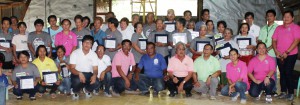Igorot upland farmers show resilience after typhoon Lando hit their rice farms in Sta. Cruz, Zambales. 
“At the sight of my rice crops hardly beaten by strong winds and seeds scattered on the ground, I was never disheartened as it didn’t leave me empty-handed. I still harvested a few bags of traditional rice seeds,” 66-year-old Benita Bayao said, during their Upland Palayamanan Farmers Field School (FFS) graduation in Sta. Cruz, Zambales, 12 November.
The Upland Palayamanan FFS in Sta. Cruz, Zambales started in April 2015. Said FFS is a program component of the Upland Rice Development Program (URDP) that aims to harness the potential of the upland rice ecosystem as among the major sources of rice supply and other food staples in the Philippines.
Bayao recalled that before the onset of Typhoon Lando, her fellow farmers told her to leave her farm. She, however, insisted to stay to watch over her crops. She said that she fears nothing when she’s in the field.
Meanwhile, Tacion Mangipay shared that for 3 years she stopped cultivating rice owing to the limited source of upland rice seeds and presence of various rice pests. Their seeds were from the Mountain Province. With the Upland Palayamanan FFS, their enthusiasm to cultivate rice was once again renewed.
She narrated that a number of people moved from the highlands of Mountain Province to the uplands of Zambales for job opportunities. They are into mining-related work.
When Mangipay joined the FFS, she received bags of Pinilisa, a traditional rice variety, which she gave a two thumbs up upon seeing them grow. However, owing to Typhoon Lando, Mangipay said that from the 9-kg Pinilisa, she only harvested 6 sacks of palay.
Despite the losses, 60-year-old Mangipay said, “I will still plant Pinilisa for the next wet season. I also plan to try other upland rice varieties.”
For subsistence farmers such as Bayao and Mangipay, participating on a rice production training means better chances at getting higher rice yield. The two added that never in their lives had they been able to participate in a similar training. The Upland FFS was their first.
Milling their produce, as in most upland communities, is a major issue for them. What usually happens is the jeepneys in their place go downhill at 2 AM so they can catch the buyers in their public market at 4am. The trek can be challenging as the drivers traverse rough roads with eroding mountains and cliffs on the side. They then go uphill at 1 PM.
For the upland farmers, a micromill would be extremely useful.




